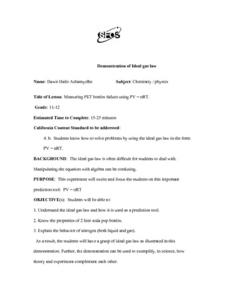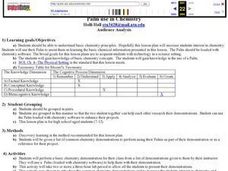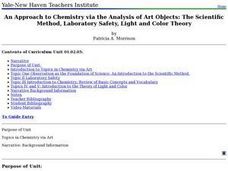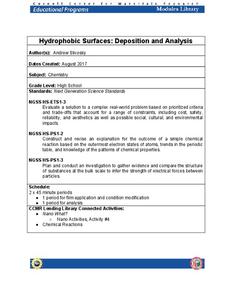Curated OER
Demonstration of Ideal Gas Law
You know that liquid nitrogen turns into a gas at room temperature. Place some in a two-liter bottle for a physics demonstration of the ideal gas law. Beware, however; this is a dangerous demonstration! Not to mention that you may not...
Curated OER
Icecream in a Baggie
Students apply their comprehension of colligative properties to real-world situations. They review the concepts of physical and chemical changes. Students are reminded that science is used extensively in food-production. They are...
Curated OER
The Coriolis Effect
Students will determine the direction of Earth's rotation as viewed from the north and south if they were suspended out in space. They will model how the rotation of the Earth causes currents to be deflected in different directions for...
Curated OER
Mini-labs on Newton's Laws
Students are divided into 6 groups with each group rotating to a different lab. The labs can be run over the course of a few days; or spread out for a longer period of time.
Curated OER
Science Investigation Using Water Quality
Eighth graders conduct an experiment that analyzes the physical and chemical characteristics of various water samples. They discuss the procedures and safety concerns for the water test, and test their water samples to determine if they...
Curated OER
Determination of Tensile Stress-Strain Common Properties in Materials
Young scholars demonstrate the relationship between stress and strain, then graph stress-strain curves for various common materials. Students interpret graphed results and discuss differences in mechanical properties of materials.
Curated OER
Palm use in Chemistry
Students use a Palm loaded with chemistry software to assist them in gaining information presented in a lesson about basic chemistry principles. They perform a basic chemistry demonstration for their class using information from received...
Curated OER
About Science
Students explain why physics is the basic science. They outline scientific methods by distinguishing among observations, facts, hypotheses, laws, and principles. Students describe the circumstances under which a hypothesis or law must be...
Curated OER
Eye Safety
Tenth graders become aware of the need for eye safety in the classroom through three mini labs.
Curated OER
Electric Shock
In this electrical worksheet, students answer a series of 17 questions about electrical shock and electrical safety. This worksheet is printable and the answers are available on-line.
Curated OER
Chemistry: merit badge
In this chemistry instructional activity, students use their workbook to answer short answer questions about chemistry and lab safety. Students complete 7 questions total to get their merit badge.
Curated OER
Electroplating for Corrosion Protection: Redox in Action
Learners define what a redox reaction is. In this chemistry lesson, students electroplate some wires in the lab. They research the application of electroplating in the real world.
University of Georgia
Monohybrid Crosses and The Punnett Square Lesson Plan
Looking for a quick, hands-on activity to teach young scientists about Punnett squares through monohybrid crosses? then check out this one.
Curated OER
An Approach to Chemistry via the Analysis of Art Objects: The Scientific Method, Laboratory Safety, Light and Color Theory
Students create a painting that clearly exemplifies the use of primary pigments to make secondary pigments. They demonstrate the distinction between value and saturation. They explain the affect of adjacent colors on each other and...
Curated OER
Blast Off
In this physical science exploration, small groups place a piece of antacid tablet into a film canister and step back to time how long it takes for the top to pop. They repeat the activity, altering either the amount or temperature of...
Curated OER
Earthquakes and Seismic Waves
Students explore earthquakes and seismic waves. They investigate how energy is released in the subsurface to create seismic waves. Students explore the inner workings of a seismograph and how they are used to determine the location of an...
Cornell University
Hydrophobic Surfaces—Deposition and Analysis
Couches, carpets, and even computer keyboards now advertise they are spill-resistant, but what does that mean? Scholars use physical and chemical methods to coat surfaces with thin films to test their hydrophobic properties. Then they...
American Chemical Society
Neutralizing Acids and Bases
Most things naturally strive for balance, and acids and bases are no exception. Neutralization of acids and bases allows scholars to explore the color changes associated with the pH scale. After this exploration, pupils neutralize two...
Curated OER
Making Soap
Students recognize and use chemical indicators in the lab, recognize the need for safety while doing chemical experiments and understand the need for following precise directions.
Curated OER
Challenges of Sampling
In this sampling worksheet, students try different sampling methods to determine which is the best for determining contamination on a substance. This worksheet has 5 short answer questions.
Teach Engineering
Investigating Contact Angle
Discover the properties of water-loving and water-hating surfaces. In the seventh installment of a nine-part series, scholars explore hydrophilic and hydrophobic surfaces by conducting an experiment. They observe surface coatings,...
Curated OER
Module 7 Revision Guide - Chemistry
Two versions of this handout are provided, the second with more detailed information on the same topics. Chemistry aces survey chemical reactions, heat energy transferred, and the action of enzymes by reading this resource. You can...
Kenan Fellows
Industrial Knowledge of Acids and Bases
Over a 10-year period, EPA regulations cost businesses less than $30 billion, while businesses saved over $82 billion. Scholars experiment with acids and bases to better understand the pH scale. Then they debate environmental regulation...
Teach Engineering
Sugar Spill!
Sugar isn't good for you, but it's great for yeast! Scholars design an experiment to investigate how variables affect the rate of sugar consumption in yeast. The last installment of a nine-part Life Science unit considers how scientists...

























